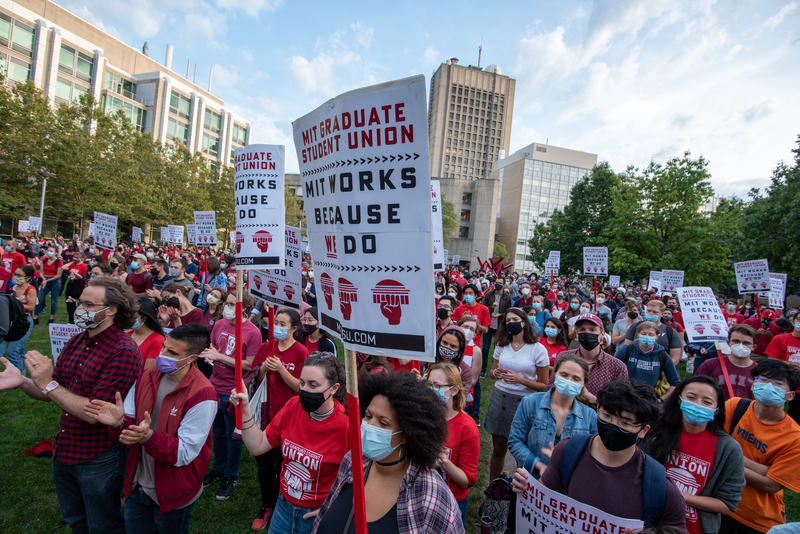UAW Region 9A Higher Education workers wrote a letter in solidarity with UE members against recent efforts by the Massachusetts Institute of Technology (MIT) and the National Labor Relations Board (NLRB) to undermine their rights.
Read the letter below, and add your name in support!
Solidarity with UE Rank-and-File Members at MIT
We, UAW Region 9A Higher Education workers, stand in solidarity with UE members against recent efforts by the Massachusetts Institute of Technology (MIT) and the National Labor Relations Board (NLRB) to undermine their rights. We support UE’s appeal of the NLRB’s MIT decision, and we invite all rank-and-file members and union leadership in Higher Education to build a sectoral strategy around our recognition as student workers that is based on job duties as opposed to job titles, degree programs enrolled, hours worked, or funding sources.
On March 13, 2023, the NLRB Region 1 ruled that externally- and internally-funded MIT graduate fellows should not be allowed to join MIT student workers’ existing bargaining unit on the grounds that they are not employees of MIT. This decision is wrong because student workers’ actual job duties, not arbitrary employer-created job titles and compensation schemes, should determine their status in a bargaining unit.
Private Universities have long resisted student workers’ unionization efforts. Their argument has been that student workers are students, not workers, and that they do not perform labor in exchange for their compensation – an argument contradicted by the fact that student workers have increasingly performed the bulk of teaching and research labor traditionally fulfilled by faculty, simply at a cheaper rate.
Energized by the historic 2016 Columbia decision that reaffirmed the employee-status of student workers, an increasing number of student workers across the country have formed their own unions and started claiming their long-overdue rights and protections as workers. In the face of this challenge, Universities are continuing their union-busting efforts through other means: by creating arbitrary titles and distinctions to exclude student workers from units.
The NLRB’s MIT decision further enables academic employers’ union-busting by misunderstanding the issue. The NLRB Region 1 Director claims that student workers providing research and instructional services whose funding derives, at least in part, from an external or internal fellowship source aren’t employees of the University. This decision serves to accommodate one of the arbitrary distinctions that Universities have created in order to deny workers their due benefits and protections in the short term and decimate the size of student workers’ units in the long term.
We know all too well that absolutely nothing distinguishes the labor of internally-funded salaried student workers from that of externally- or internally-funded stipended student workers. These workers have the same teaching and research duties. They often work in the exact same laboratories, classrooms, and projects alongside salaried student workers under the same supervisors and faculty. Researchers of all funding types, whether salaried or hourly or through fellowships, contribute to the same publications and grant applications, collectively bringing in hundreds of millions of dollars in revenue for the University through indirect fees and overheads. In fact, it is customary for student workers to switch their source of funding throughout the duration of their studies with little or no change in workplace responsibilities. It is an ironic and infuriating reality that Universities continue aggressively attempting to strip student workers funded through fellowships of their collective bargaining rights, given that these workers are encouraged by the Universities themselves to secure this external funding, as these fellowships and training grants bring substantial prestige and funds to the University with a minimal compensation increase for workers, if any. This trade-off will disincentivize student workers from seeking them at the expense of the Universities’ funding because we know that the conditions under which we teach and research are directly related to the strength of our collective power.
In recent years, Higher Education unions have energized the labor movement across the country. But we cannot keep this momentum unless we continue to fight against Universities’ continued attempt to take these wins from us by decimating the size and breadth of student workers’ units through arbitrary titles and distinctions. These carve-outs undermine our ability to strike collectively, weakening our ability to win our other major demands, such as winning raises with a cost-of-living adjustment (COLA) and strong protections from discrimination and harassment. To stem this requires us to fight for an inclusive definition of recognition of student workers that is based on the service provided, as opposed to any of the arbitrary distinctions and titles that Universities have created.
As rank-and-file student workers, we have proposed a Resolution on Building Inclusive Bargaining Units to this year’s UAW Bargaining Convention, and we welcome student workers in other unions to consider adopting a similar strategy. We encourage all rank-and-file student workers to consider the strength of organizing inclusive bargaining units at the early stages of organizing campaigns and oppose the carving-out of student workers in NLRB filings and during bargaining. We also urge organizers to make an inclusive definition of their bargaining unit a priority and continue actively fighting against their employers’ attempts to carve out groups of workers, both through legal challenges and rank-and-file mobilization around this issue.
We stand with UE and look forward to working with other Higher Education union members to fight back against these brazen and bad-faith attacks on our collective bargaining rights.

